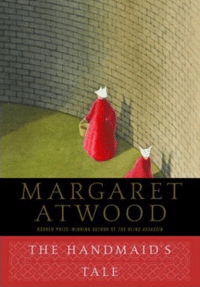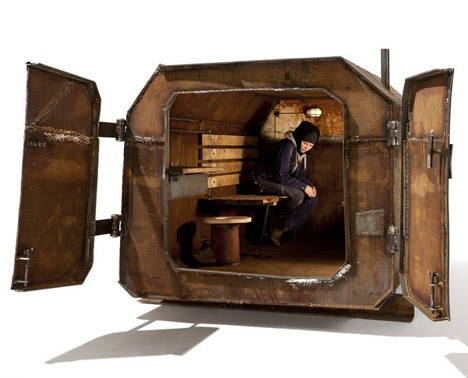“Huge change is no longer in the past or future but in the present. Our society as we know it and have known to be safe is fast-changing. Value systems of yesterday are no longer relevant. A new civilization is ahead of us. This ideological society offers choice; are we able to find alternate ways of living, another model or are our days counted? The changing climate, growing poverty, wars and more are only expanding. This movable nomadic dwelling unit provides shelter from this disconcerting situation.”
Tag Archives: dystopia
The Handmaid’s Tale by Margaret Atwood
 I read The Handmaid’s Tale 25 years ago and it scared the crap out of me. It’s the story of “a future America under the violently oppressive rule of a far-right Christian sect. Women are back in the home and divided into domestic and reproductive functions, branded by coloured robes.”
I read The Handmaid’s Tale 25 years ago and it scared the crap out of me. It’s the story of “a future America under the violently oppressive rule of a far-right Christian sect. Women are back in the home and divided into domestic and reproductive functions, branded by coloured robes.”
If Tea Partiers read books this one would make them say “Hell yeah!” The rest of us cross our fingers and say, “It can’t happen here.” But it can, of course. We’re closer today than when the book was published.
The Handmaid’s Tale
“The Handmaid’s Tale is set in the Republic of Gilead, a country formed within the borders of what was formerly the United States of America by a racist, chauvinist, nativist, theocratic-organized military coup motivated by an ideologically-driven response to the pervasive ecological degradation of the land, widespread infertility, and attendant social dislocations. Beginning with a staged terrorist attack killing the President and ousting Congress, the coup leaders launched a revolution which overthrew the United States government and abolished the US Constitution. The new theocratic military dictatorship, styled “The Republic of Gilead”, moved quickly to consolidate its power and reorganize society along a new militarized, hierarchical, compulsorily-Christian regime of Old Testament-inspired social and religious orthodoxy among its newly-created social classes.”
Plot summary of The Handmaid’s Tale, by Margaret Atwood (Wikipedia). Sound familiar? Published in 1985.
“No surprises”
I love the novels of Neal Stephenson and find that I can read them again and again, always discovering something new and fresh. The excerpt below is from Snow Crash, written in 1976. published in 1984.
“The people of America, who live in the world’s most surprising and terrible country, take comfort in that motto. Follow the loglo outward, to where the growth is enfolded into the valleys and canyons, and you find the land of the refugees. They have fled from the true America, the America of atomic bombs, scalpings, hip-hop, chaos theory, cement overshoes, snake handlers, spree killers, space walks, buffalo jumps, drive-bys, cruise missiles, Sherman’s March, gridlock, motorcycle gangs and bungee jumping. They have parallel-parked their bimbo boxes in identical computer-designed Burbclave street patterns and secreted themselves in symmetrical sheetrock shitholes with vinyl floors and ill-fitting woodwork and no sidewalks, vast house farms out in the loglo wilderness, a culture medium for a medium culture.”
It means nothing out of context, I suppose, but this is where I put things I want to find again. I don’t think I’ve ever seen Neal Stephenson do an interview but perhaps I just missed them.
Bruce Sterling’s Distraction
If you’re looking for an interesting read over the long weekend, may I suggest Distraction, by Bruce Sterling. I read this book in October of 2004, long before my political awakening. Here’s a short review on Boing Boing:
Distraction is the story of an America on the skids: economy in tatters, dollar collapsed, unemployment spiked, population on the move in great, restless herds bound together with networks and bootleg phones. The action revolves around Oscar Valparaiso, a one-of-a-kind political operator who has just put his man — a billionaire sustainable architecture freak — into the Senate and is looking for some downtime. But a funny thing happens on the way to the R&R: Oscar and his “krewe” (the feudal entourage who trail after him, looking after his clothes, research, security, systems and so on) end up embroiled in a complex piece of political theater, a media war between the rogue governor of the drowned state of Louisiana, the Air Force, the newly elected president, and a weird, pork-barrel science park in its own glassed-in dome.
I’d love to know how many books and screenplays about the 2008 campaign are in the works.
Go-Go Girls of the Apocalypse
From Victor Gischler’s Go-Go Girls of the Apocalypse:
“No single thing had doomed (the) planet. Rather it had been a confluence of disasters. Some dramatic and sudden, others a slow, silent decay.
The worldwide flu epidemic had come and gone with fewer deaths than predicted. Humanity emerged from that long winter and smiled nervously at one another. A sigh of relief, a bullet dodged.
That April the big one hit.
So long feared, it finally happened. The earth awoke, humped up its spine along the San Andreas. The destruction from L.A. to San Francisco defied comprehension. The earthquake sent rumbles across the Pacific, tsunamis pounding Asia. F.E.M.A immediately declared its inadequacy and turned over operations to the military. The death toll numbered in the millions, and nothing –not food nor fuel– made it through West Coast seaports. The shortages were rapidly felt across the Midwest. Supermarkets emptied, and no trucks arrived to resupply them.
Wall Street panicked.
Nine days later a Saudi terrorist detonated a nuclear bomb in a large tote bag on the steps of the Capitol building. Both houses of Congress were in session. The president and vice president and most of the cabinet were obliterated.
The secretary of the interior was found and sworn in. This didn’t sit well with a four-star general who had other ideas. Civil war.
Economic spasms reached the European and Asian markets.
Israel dropped nukes on Cairo, Tehran and targets in Syria.
Pakistan and India went at it.
China and Russia went at it.
The world went at it.
It was pretty much all downhill from there.”
Snow Crash: CIC database
From Neal Stephenson’s Snow Crash, published in 1976. 22 years before Google; 29 years before YouTube; 32 years before the Bail Out/Melt Down.
“The business is a simple one. Hiro gets information. It may be gossip, videotape, audiotape, a fragment of a computer disk, a xerox of a document. It can even be a joke based on the latest highly publicized disaster.
He uploads it to the CIC database — the Library, formerly the Library of Congress, but no one calls it that anymore. Most people are not entirely clear on what the word “congress” means. And even the word “library is getting hazy. It used to be a place full of books, mostly old one. Then they began to include videotapes, records, and magazines. Then all of the information got converted into machine-readable form, which is to say, ones and zeros. And as the number of media grew, the material became more up to date, and the methods for searching the Library became more and more sophisticated, it approached the point where there was no substantive difference between the Library of Congress and the Central Intelligence Agency. Fortuitously, this happened just as the government was falling apart anyway. So they merged and kicked out a big fat stock offering.
Millions of other CIC stringers are uploading millions of other fragments at the same time. CIC’s clients, mostly large corporations and Sovereigns, rifle through the Library looking for useful information, and if they find a use for something that Hiro put into it, Hiro gets paid.”

